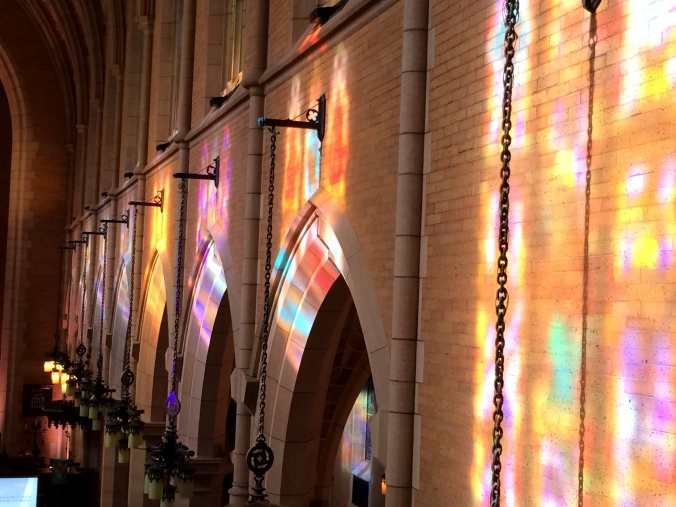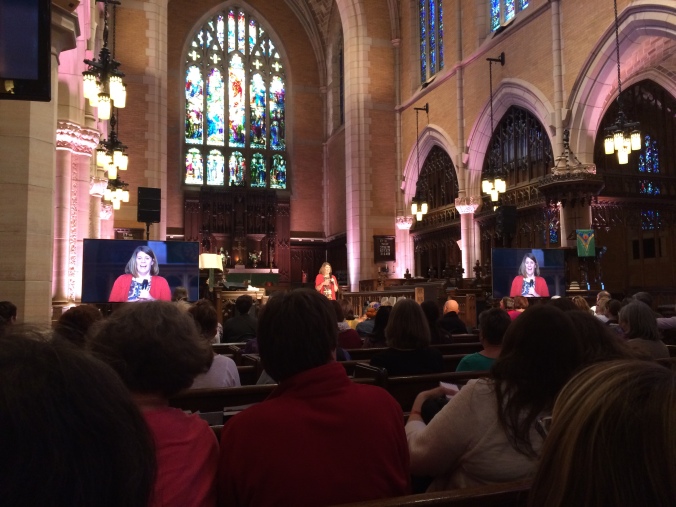On Saturday, September 12th, I led the Spiritual Formation Academy retreat on mission, and, specifically, on friendships at the margins (if you haven’t read Friendship at the Margins by Chris Heuertz and Christine D. Pohl, I highly recommend it). One of four sessions was on the necessity of such friendships: not only is it important to recognize those who have been pushed to the margins, relationships with them are necessary for our (privileged) hearts, our spiritual formation, and our calling to love all of our neighbors (not just the ones who look, talk, or act like us). After the retreat was over, I scrambled to get my work for the next week done and then quickly left for the Why Christian? Conference in Minneapolis. There, I was going to hear over fourteen women pastors, writers, and leaders speak about their lives and experiences.
First, let me just say: wow. The cathedral where we met was gorgeous, the worship was a source of joy and renewal, the gathering of so many different denominations together to dialog in love was hopeful. But above everything else, I was strongly and forcefully reminded of the necessity of diverse voices in my life, and in the life of the body of Christ. It made my talk the Saturday before feel like someone describing what a tiny rainbow reflected from a prism might look like, when all the while outside the window there is a glorious rainbow splashed across the sky. I was struck to the core by the reminder that I am living in a muted echo of the true body of Christ when I am cut off from those with different experiences, traditions, beliefs, and practices.
At the conference all of the speakers’ talks centered on the question, “Why am I a Christian?” This may seem simple, but each of the speakers had come from a place of rejection or deep wounding by the Church, and all of the speakers still choose to engage with the Church in spite of those wounds. We heard from women who had been rejected for their gender, their sexuality, their race, their ethnicity, and their “rebellious” individuality. What an amazing blessing to hear so many women of deep faith share their stories, wounds, anger, and hope. Over and over again I realized how little I could understand Christ, or the Church at work in the world, when I limit the voices I hear to solely those who sound like or agree with me.
I need to be stretched by the struggles, anger, and stories of those who are different than me. I need to be able to listen with love and compassion to ideas and experiences that I may not want to hear, or that I don’t understand. Those who have experienced abuse, rejection, or violence at the hands of the Church or Christians have a right to express their frustration, anger, hurt, or betrayal without being judged for it. Without everyone’s presence and voices at the table, the body of Christ will never be a full or vibrant reflection of God and God’s kingdom.
What does this mean for us? Well, practically for me it means that I am subscribing to and reading blogs that represent different perspectives. I am praying that God will open me up to be ready to enter in to and listen well to new/different/diverse perspectives. These perspectives could be here in Folsom, or across the U.S., or elsewhere in the world.
I am also making sure that I make space to honor other peoples’ anger. So many of the speakers talked about not being allowed to be angry. Because they are Christian, they have felt the pressure to end their story on a high note, with forgiveness and healing, rather than raw wounds. That’s not to say that forgiveness and healing are not important–they are integral to life in the Kingdom of God. However, when I want someone who has been hurt/marginalized due to her race to talk about her healing, it more often has to do with me being uncomfortable with her anger, rather than simply a desire for her healing. I need to understand that many wounds run deep, and I need to make space for and honor the pain that my brothers and sisters in Christ have experienced, rather than gloss it over. Even if that makes me uncomfortable. Especially if that makes me uncomfortable.
Lastly, I am reminding myself daily that really, this is about love. I am called to love all of Christ’s body, from the toes to the arms to the split ends. I can’t love what I have never met, and when I meet a part of the body that is new or different (or just gets on my nerves) with fear/frustration/judgement, it becomes very difficult for me to love well. And loving God and our neighbors is pretty central to the Gospel (read: the most important things we are told to do, according to Jesus).



Beautifully written. I am very proud of you.
LikeLike